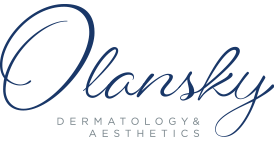Did you know that a skilled dermatologist can help improve the health of your skin as well as the appearance of your skin? Dermatology offers both cosmetic and medical treatments to help patients retain or achieve their most confident skin. If you are uncertain as to whether your skin concerns fall in the cosmetic or medical field of dermatology, here is a quick overview to guide you.
Comprehensive Skin Treatments
At Olansky Dermatology, we offer comprehensive care. This means we value the importance of delivering both medical and cosmetic dermatology treatments in one place. While cosmetic dermatology often focuses on helping patients look younger or more attractive, medical dermatology is centered around health issues related to the skin. It is not uncommon, however, for cosmetic dermatology and medical dermatology to overlap. After all, healthy skin is typically skin that is more attractive and youthful compared to unhealthy skin.
What’s Cosmetic Dermatology?
Cosmetic dermatology typically includes a wide variety of non-surgical treatments to improve the appearance of the skin. Thanks to innovations and advancements in technique and technology, the field of cosmetic dermatology is growing rapidly. Patients of all ages and skin types can take advantage of minimally-invasive procedures to turn back the hands of time or reverse skin imperfections throughout the body. As with any cosmetic treatment, these are services that are typically optional and may not be covered by insurance.
Cosmetic dermatology includes a broad range of services, including the following:
- Skin care products
- Injectables (fillers and Botox)
- Laser therapy
- Vein removal
What’s Medical Dermatology?
Medical dermatology is often what people think of when considering dermatology. It includes the diagnosis and treatment of medical conditions of the skin. Keep in mind that your skin is the largest organ in your body, so medical dermatology treatments can be diverse and widespread. Some medical skin conditions are harmless (such as eczema), while others can be life-threatening (such as skin cancer). In any case, however, medical dermatology is designed to treat and manage the skin conditions that occur when the health of your skin is compromised in some way. This can be an acute skin reaction or a chronic skin condition that needs to be managed throughout your entire life. Medical dermatologists should complete four years of medical school, one year of internship and three years of additional training in a specialized field.
The following are some top conditions that medical dermatology addresses:
- Skin Cancer
- Acne
- Eczema
- Rosacea
While many medical dermatology conditions can pose aesthetic concerns, it is important to treat them with a medical approach. An experienced dermatologist from our Atlanta team can accurately determine if your skin concerns are medical or cosmetic in nature, as this is important to a successful treatment plan.
To learn more about our expansive list of medical and cosmetic dermatology treatments at Olansky Dermatology, please call our office. We want you to feel and look your best in your skin!


